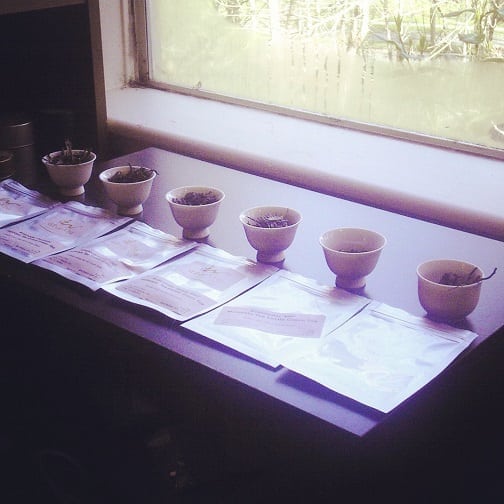Full circle, man.

Let me explain.
About a year and a half ago, I did a write-up on Russian grown tea, specifically a black tea from the Krasnodarskiy brand. My verdict was, “Eh.” However, I didn’t disregard the Dagomys region of Krasnodar completely. According to some sources, the tea gardens in the region were stepping up their quality. Part of that was because of last year’s Winter Olympics.
Fast-forward to December of 2014, Natasha Nesic (formerly The Snooty Tea Person) informed me of an online tea company based in the U.K. called What-Cha. Among their many, eclectic wares were “collections” highlighting specific growing regions around the world – India, Nepal, Malawi, Europe (!!!), and . . . Russia.
First thing I notice were the Russian non-black tea collections. That was new. When did they start experimenting with anything but black tea?! I got in touch with the company head – Alistair Rea – to acquire some. And he dropped the biggest bombshell I ever swallowed.
His inspiration for carrying Russian grown tea was because of the blog I wrote on the subject. He even wrote about his search HERE. So, to summarize: I wrote a blog on Russian tea, which in turn inspired someone to carry said tea, and then I approached said company to acquire said tea . . . to write a blog about it.
Like I said . . . full circle, man.
Of the samples he sent, there were six green teas to sip.
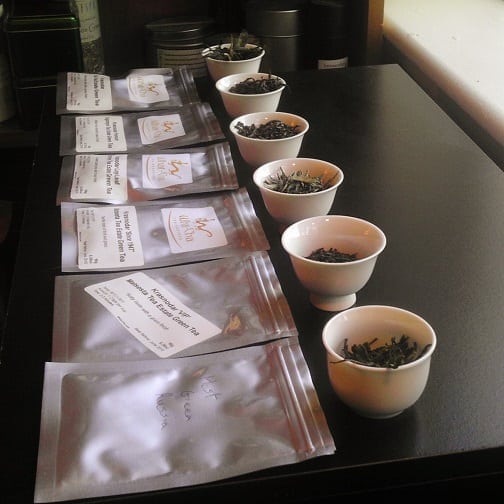
They hailed from four different tea estates in the region – Solohaul, Dagomys, Matsesta, and Host. There wasn’t much information on any of them, aside from mentions on Steepster (pertaining to What-Cha). I wondered how best to dig into them. One at a time? Side-by-side? Nah . . . all at once! A veritable game of Russian green tea roulette. Six teas; one tasting session.
Krasnodar Solohaul Tea Estate Green Tea
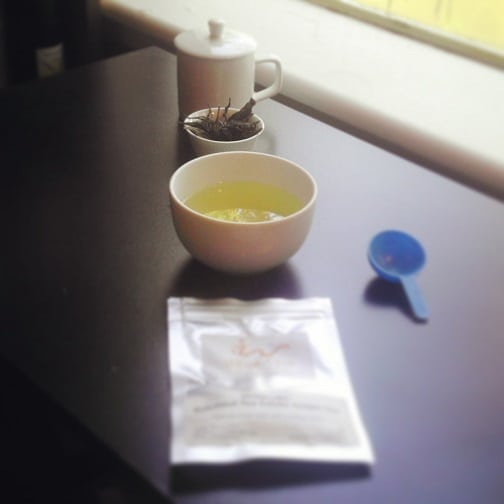
Appearance/Aroma: The leaves were large, twisted and dark green. The fragrance they gave off was all wintergreen and forest floor – minty, slightly earthy and grassy.
Brewed: The liquor was bright yellow-gold with a faint aroma of melons, more of a likeness to a bold white tea than a green. The flavor was both buttery and fruity with a slight, mellow sweetness on the back.
Verdict: Definitely a hit. An almost-perfect green tea on delivery.
Krasnodar Premium Dagomys Tea Estate Green Tea
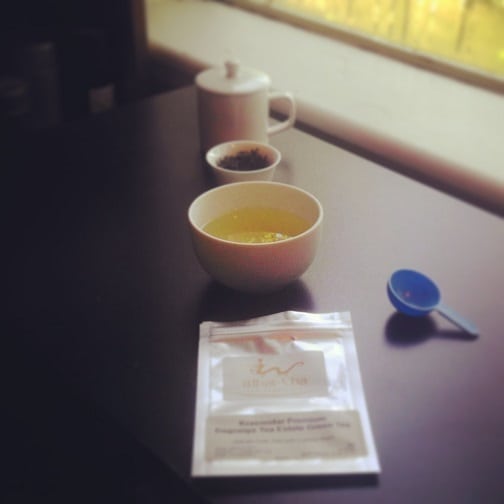
Appearance/Aroma: The leaves were green and brown, rolled tightly to the likeness of twigs and stems. They smelled like straight juniper berries, in that “gin and tonic” sort of way.
Brewed: The liquor brewed light green with a very . . . uh . . . green tea aroma. It reminded me of a mid-grade Darjeeling green – slightly grassy, but not grapy. There really isn’t much to say about it other than that.
Verdict: A near-hit, chamber misfire. It was okay, but nothing memorable.
Krasnodar Large Leaf Dagomys Tea Estate Green Tea
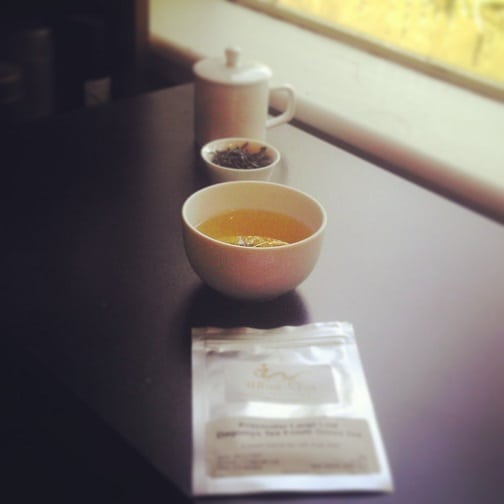
Appearance/Aroma: Contrary to what the name implied, the leaves were smaller cut, conically rolled – very similar to a Chinese Bi Luo Chun, only a more vibrant green color. The aroma was earthy, floral, and vaguely citrus.
Brewed: The liquor brewed fairly dark. Well, by dark I mean light amber. So, dark for a green tea. The steam smelled of sage growing on a cliff side – very oolong-y. On sip, grass hit the tongue first, followed by this burly, floral note, and chased by a nice, wilderness-y finish.
Verdict: A hit. Bullet would’ve gone clean through. A very good, serviceable green.
Krasnodar ‘Since 1947’ Matsesta Tea Estate Green Tea
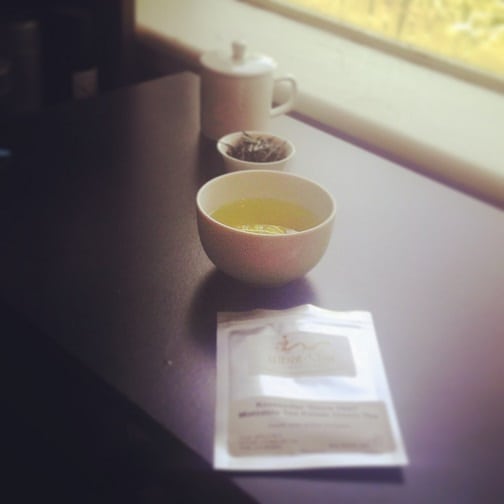
Appearance/Aroma: This was a straight-up Long Jing (Dragonwell) on appearance and smell. The leaves were medium-green, plank flat, and a decent length with an alternating grassy and winy aroma.
Brewed: The liquor brewed bright, almost “radioactive sencha” green with an herbal salad-like aroma. There was a spiciness to the smell that reminded me a little of sage or oregano. On taste, it reminded me of a Chunmee – a lower-grade Chinese green. Not un-drinkable but definitely far too grassy for my palate.
Verdict: Empty chamber. Way too grassy a green.
Krasnodar ‘VIP’ Matsesta Tea Esate Green Tea
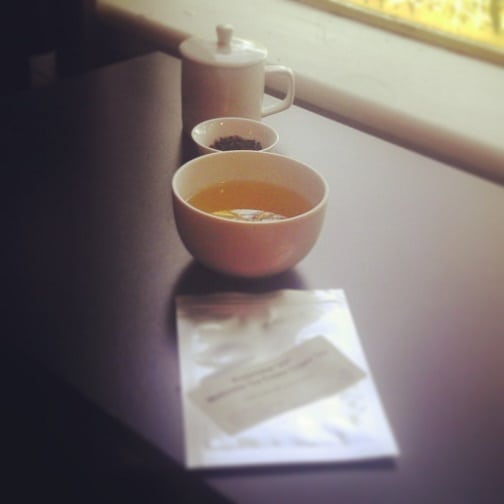
Appearance/Aroma: The leaves were very small, likely given a BOP (broken orange pekoe) cut, but gave off an aroma of sweetened nuts and barley powder.
Brewed: The liquor brewed an even, medium green with a strange scent of sunflower seeds. I wasn’t expecting that. On taste . . . oh my, yum. Straight almond awesomeness. It ended with a bit of a grassy finish, but it was still lathered in nutty goodness. So nuts! (Badam-bum.)
Verdict: Boom. Headshot. Straight between the eyes. A very satisfying green tea.
Host Estate Green Tea

Appearance/Aroma: These were the wildest looking of all the Russian green teas, like they were plucked from feral trees or something. Sure they looked picked and rolled, but there seemed something natural about the process. The aroma they gave off was equally “wild” – herbaceous and floral, almost like pre-processed pu-erh maocha.
Brewed: The liquor was a vibrant, lively green with a spry, fruity aroma. The taste just about kicked my head back with “WOW!” I couldn’t tell you what fruit or melon the taste was indicative of, but I was floored by it. It was like a Long Jing paired off with a biodynamic Indian green and came back with a halo-adorned offspring. Christ on a unicycle, this was perfect!
Verdict: I’m dead. Turn me over. I’m done. So wonderful.
In summary, if this had been an actual game of Russian roulette, four chambers would’ve been loaded, two bullets would’ve missed, two would’ve grazed and/or wounded me . . . and I would’ve died twice. A morbid metaphor to end on, but totally applicable.
The clear winner was the Host tea estate. Whatever they’re doing, they can keep on doing it. From what I witnessed, they were also experimenting with yellow tea and oolong tea styles. Good on ‘em. All in all, happy with the results. Russian tea has come a long way in such a short time.
